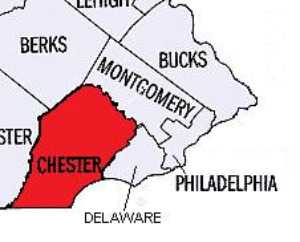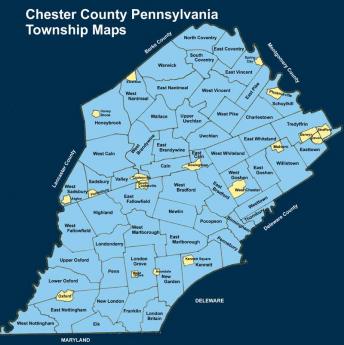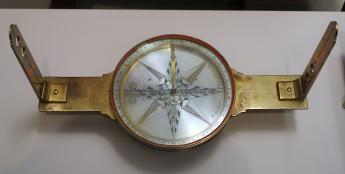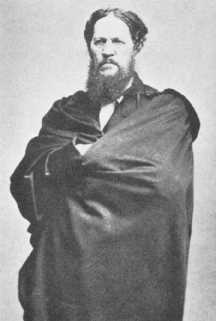Related Topics
Delaware (State of)
 Originally the "lower counties" of Pennsylvania, and thus one of three Quaker colonies founded by William Penn, Delaware has developed its own set of traditions and history.
Originally the "lower counties" of Pennsylvania, and thus one of three Quaker colonies founded by William Penn, Delaware has developed its own set of traditions and history.
Sights to See: The Outer Ring
There are many interesting places to visit in the exurban ring beyond Philadelphia, linked to the city by history rather than commerce.
Tourist Trips Around Philadelphia and the Quaker Colonies
The states of Pennsylvania, Delaware, and southern New Jersey all belonged to William Penn the Quaker. He was the largest private landholder in American history. Using explicit directions, comprehensive touring of the Quaker Colonies takes seven full days. Local residents would need a couple dozen one-day trips to get up to speed.
Touring Philadelphia's Western Regions
Philadelpia County had two hundred farms in 1950, but is now thickly settled in all directions. Western regions along the Schuylkill are still spread out somewhat; with many historic estates.
The Main Line
Like all cities, Philadelphia is filling in and choking up with subdivisions and development, in all directions from the center. The last place to fill up is the Welsh Barony, a tip of which can be said to extend all the way in town to the Art Museum.
Customs, Culture and Traditions (2)
.
Chester County, Pennsylvania
 Chester was an original county of Pennsylvania, one of the largest until Dauphin, Lancaster and Delaware counties were split off. Because the boundaries mainly did not follow rivers or other natural dividers, translating verbal boundaries into actual lines was highly contentious.
Chester was an original county of Pennsylvania, one of the largest until Dauphin, Lancaster and Delaware counties were split off. Because the boundaries mainly did not follow rivers or other natural dividers, translating verbal boundaries into actual lines was highly contentious.
Chester County, Pennsylvania

|
| Map of Chester County |
Chester County was one of the four original counties of Pennsylvania, as first laid out by its first white owner, William Penn. Although several parts of Chester County have been cut away, what's left is still quite large. Lancaster County was separated in 1729, and in 1785 Dauphin County was separated from that. In 1789, Delaware County was separated. If you stand in the horse country of Chester County, you still might find it hard to believe anything much has happened in three hundred years. But as a matter of fact, the present population residing within Penn's original boundaries of Chester County would make it the most populous county in the state and growing steadily. Since Philadelphia and Pittsburgh are meanwhile shrinking in population, projected future relationships would strike most residents of Chester County as quite remarkable. Horses, that's what Chester County wants to be all about. Even the mushroom growers of Kennett Square sort of count as part of the horse industry, because mushrooms are grown on horse manure, in the dark. Electronics and steel mills are not exactly traditional, but they reside here, too. As a small footnote, the Lukens Steel Company was recently purchased by an investor named Ross, who lumped it with several other steel mills and then sold the bundle to an owner in India. The consequence is that Chester has a footprint of the largest steel company in the world, or the largest steel company in India, whichever way you wish to style it. Nevertheless, the neighborhood still looks like horse country.
Furthermore, southern Chester County is socially part of the state of Delaware, while western Chester County is thoroughly Pennsylvania Dutch. Up north, the Philadelphia Main Line is building mansions as fast as mortgage originators will allow, and many of them end up paying Chester County taxes. All along Route 202, the central artery of the Great Valley, stretches a burgeoning electronics industry, within which is found Vanguard, the largest investment company in America, or possibly the second largest, depending on temporary quirks of mark-to-market pricing. Chester County presently has the highest average personal income of any county in America. It is far from true that everybody has a horse farm or a trust fund.

|
| David Rittenhouse's compass |
In a spiritual sense, Chester County horse culture contiguously spreads far beyond even historic outlines of Chester County. The boundaries of southeastern Pennsylvania were laid out with David Rittenhouse's compass, so the rolling hills suitable for horse farming extend into the states of Delaware and Maryland, and of course out into Lancaster and Dauphin counties, without much visible sign of individual state or county. In Europe, by contrast, almost all boundaries are set by rivers and mountain ranges, so the physical appearance of the countryside is apt to change sharply when crossing political borders. In fact, it is possible to say it in reverse: the State of Delaware is mostly Chester County extended, at least in its upper third. Below that lies urban and suburban Wilmington, and below that ("south of the canal") spreads loamy flat farm country, formerly slave country. Maryland divides similarly; an upper third of Maryland's rolling hillsides (sometimes known colloquially as Chester County extended), followed on the south by tidewater Maryland, in turn, followed by the suburbs of Washington, DC. The remnants of Baltimore are mixed in there somewhere, too. When you drive through miles of silent prosperous farms, regardless of highway signs, it is natural to think of yourself in the heart of America.
The one thing Chester County never much warmed to was Universities. It may shock residents of New York City to hear that Chester County never thought much of having its own art museums, classical music, theater performances or opera. However, Chester County doesn't share typical urban dislikes, either. Local speech patterns suggest Appalachian hillbillies and the Pennsylvania Dutch L'il Abners are just like us, just not so rich. Chester County sometimes thinks of itself as nobility, but it isn't Ivy League nobility, it's a country squire. We all like horses, dogs, and guns, we can't imagine why everyone else doesn't like them, too. Chester County has more history than almost anybody; it just doesn't talk much about it.

|
| Josiah Harlan |
So let's mention just the highlights: George Washington fought the battle of the Brandywine, the biggest battle of the American Revolution, in Chester County, the Paoli Massacre was long regarded as the second nastiest event of that campaign. A local farmer's son, Josiah Harlan (1799-1871), did what the Tsars and Dictators of Russia and the Kings and Queens of England couldn't do; he conquered Afghanistan. Moreover, he did it single-handedly, making himself King. Even the 350 American Rangers who conquered Afghanistan in 2002 can't match that exploit by this local Quaker boy. The first intern doctor of the first hospital in America (Jacob Ehrenzeller) spent his long life practicing in Chester County. The only President of the United States to come from Pennsylvania (James Buchanan) hailed from Lancaster, not terribly long after it split off from Chester County. In a wry sort of way, it can be said that Buchanan created the Republican Party by almost getting us to annex Cuba. Harrisburg, the present capital of the state, was once part of Chester County. Major portions of both British General Howe's and General Washington's armies left the Brandywine battlefield and swept up the Great Valley of Chester County to Philadelphia and Valley Forge, respectively. Conestoga Creek was once part of Chester County, and Conestoga wagons took many generations of settlers westward to build the new nation; wagons do go pretty naturally with horses. But drive through miles of Chester County today, usually alone through the silent stone barns and rolling grasslands: nothing much seems to have happened except real estate is more expensive.
But then, just drive up Route 202 from Wilmington to King of Prussia, at rush hour. This may be the Great Valley where Washington retreated to Valley Forge, but now it's where employees of the electronics industry ferry children to school, in order to get into the Ivy League, and maybe to shop at fancy stores in King of Prussia. With time out for a recession, it could be wall-to-wall McMansions around here in a generation. It seems almost certain the future will bear little resemblance to the past. It's sort of a pity, it is a great economic opportunity, and it seems inevitable.
Originally published: Thursday, July 08, 2010; most-recently modified: Wednesday, May 15, 2019